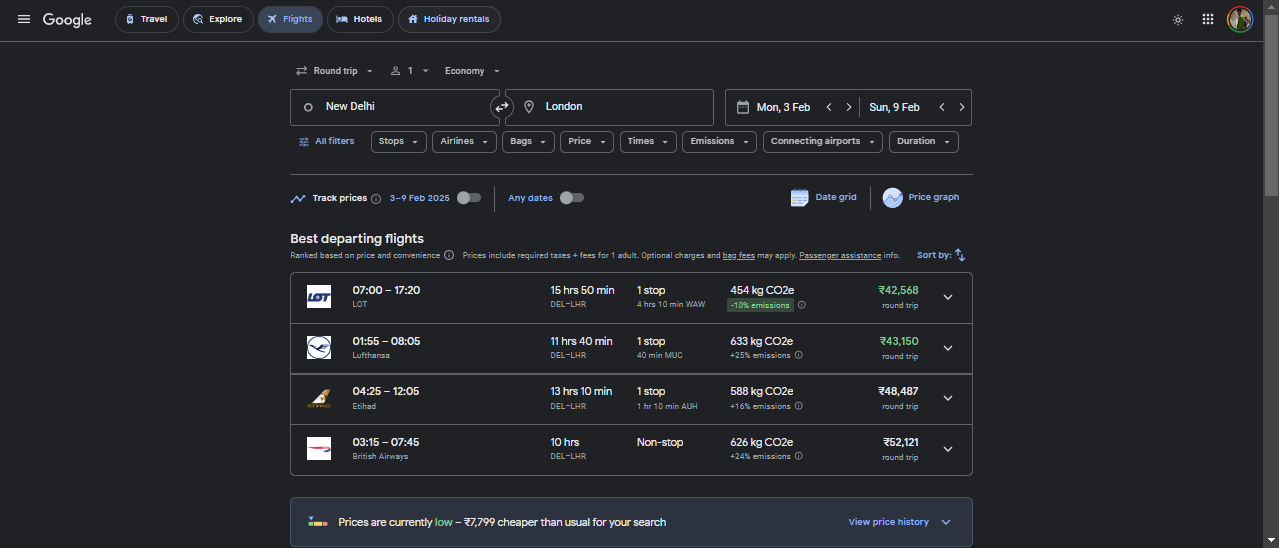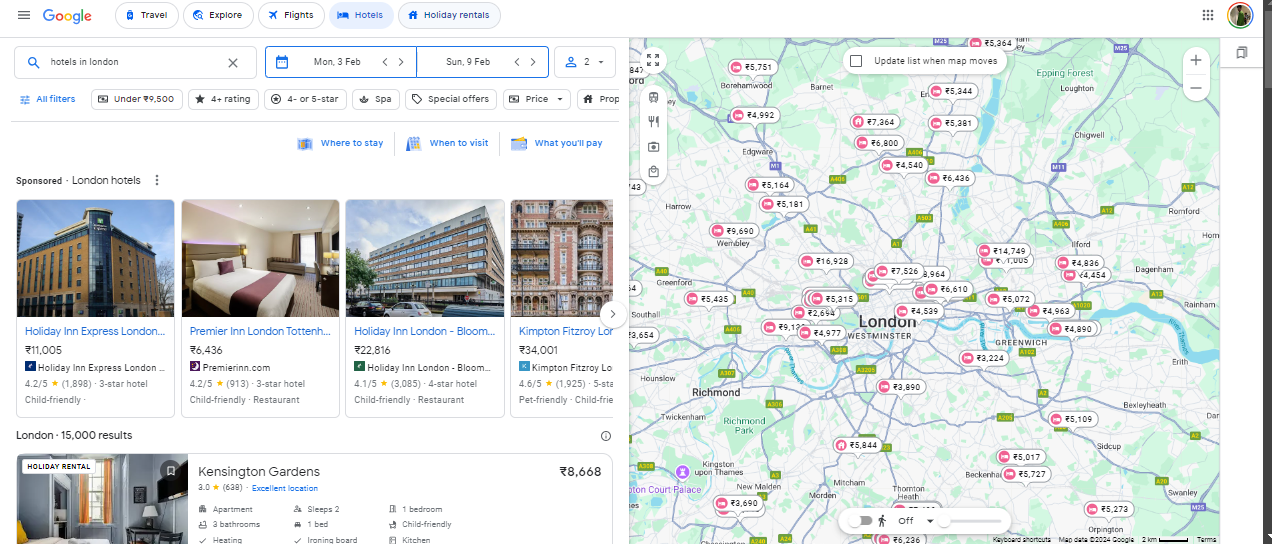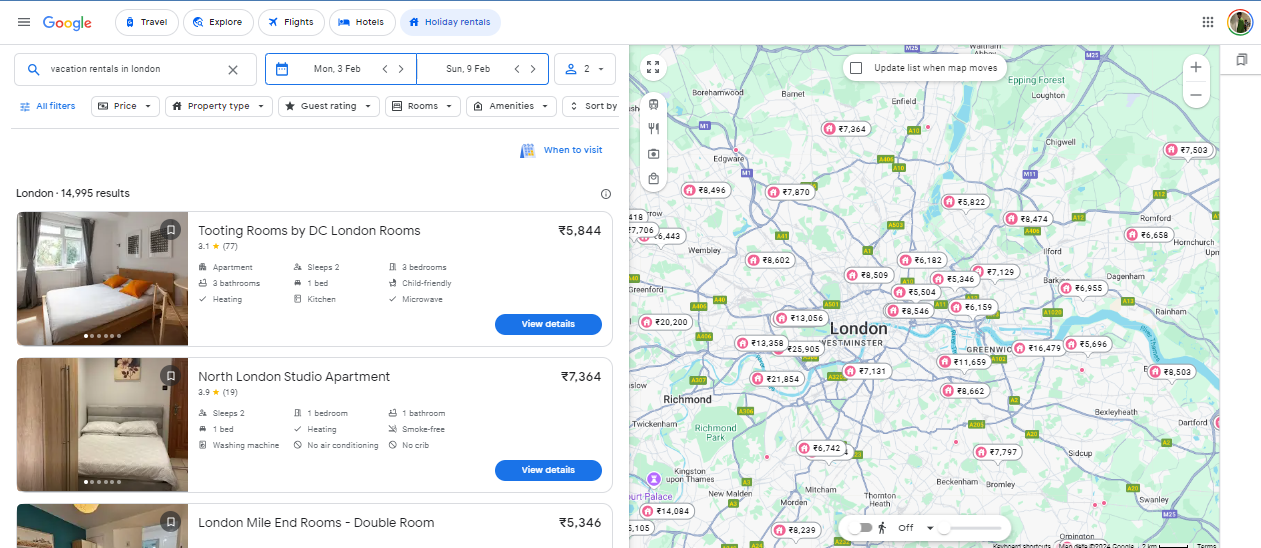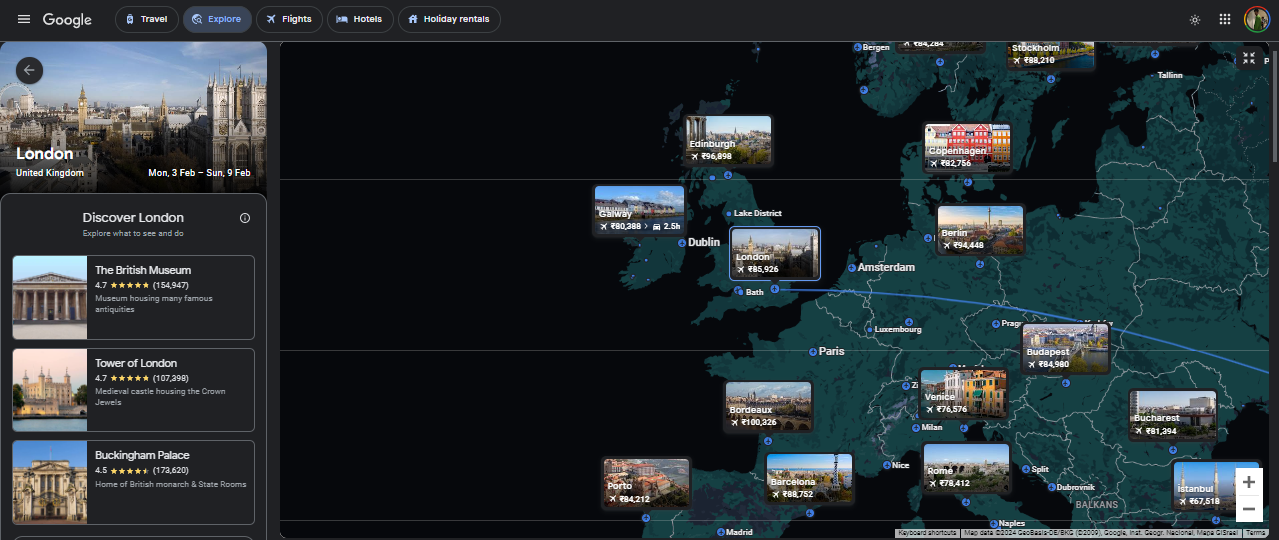
Imagine this: you're the owner of a charming boutique hotel nestled in the Cotswolds. You've poured your heart and soul into creating a unique guest experience, but lately, you've noticed a worrying trend. Direct bookings are dwindling, and more and more of your guests seem to be finding you through Google Travel. Sound familiar? If so, you're not alone.
The truth is, that Google Travel has become a dominant force in the online travel industry. Google Flights and Google Hotels are often the first thing travellers see when they search for flights or accommodation. It's easy to see why many travel businesses feel threatened by this – it's like Google has built its travel agency right there in the search results!
But don't despair! While Google Travel's rise presents challenges, it also offers incredible opportunities. Think of it as another powerful channel to reach potential customers. The key is to adapt your strategy and learn how to play Google's game. That's where we come in.
At Envigo, we're digital marketing experts who help travel businesses like yours thrive. We'll show you how to optimise your online presence, attract more direct bookings, and reduce your reliance on online travel agents (OTAs).
Understanding Google Travel
Okay, let's get a clearer picture of what we're dealing with. Google Travel isn't just one thing; it's a whole suite of tools designed to help travellers plan their journeys. Think of it as a one-stop shop for all things travel, right there within Google Search.
You've got Google Flights for comparing airfares, Google Hotels for finding accommodation, Google Vacation Rentals for those seeking a home away from home, and Google Explore for discovering new destinations. Each of these platforms has its unique features and search results pages, but they all share one thing in common: they're incredibly user-friendly.
Now, why is Google Travel so dominant? Well, let's be honest, Google has the power of, well, Google behind it! Their massive reach, combined with their knack for creating intuitive interfaces, means they can capture a huge audience. Plus, they have the resources to constantly refine their algorithms and provide highly relevant results.
Google Travel is a major player, and it's here to stay. But that doesn't mean you have to surrender your bookings to the OTAs.
How to win?
Here's the good news: Google isn't acting as a travel agent for most of these bookings. They're primarily a search engine and advertising platform, connecting travellers with providers. This means you can still compete for those valuable direct bookings. You just need to be smart about it.
Think of it like this: Google Travel is a bit like a bustling high street. You wouldn't just open a shop and expect customers to flock in, would you? You'd need a shop window that grabs attention, clear signage, and compelling products.
The same applies to Google Travel. You need to make sure your travel business stands out from the crowd. This means optimising your online presence to ensure you appear prominently in Google Travel search results.
Let's break down how to do this for each of the main Google Travel platforms.
1. Optimise for Google Flights
Alright, let's start with Google Flights. This is where travellers go to compare prices and find the best deals on air travel. To make sure your airline or travel agency appears in these results, you need to speak Google's language. How do you do that? With something called schema markup.
Schema Markup
Think of schema markup as a set of instructions you give to Google. It's code that you add to your website to help Google understand the information on your pages. In the case of flights, you'd use flight schema markup to provide details like departure and arrival airports, dates, times, and, crucially, prices. This helps Google display your flights correctly in Google Flights results, increasing your chances of attracting clicks.
Competitive Pricing
Let's face it, price is a major factor for most travellers. Google knows this, and their algorithms take pricing into account when ranking flights. So, keep an eye on your competitors' fares and make sure yours are competitive. Consider offering special deals or promotions to make your flights even more enticing.
Landing Page Optimisation
When someone clicks on your flight in Google Flights, where do they land? Hopefully, on a dedicated landing page that's optimised for both keywords and user experience. This page should be easy to navigate, clearly display the flight information, and have a prominent "Book Now" button. Remember, the easier you make it for people to book, the more likely they are to convert.
Technical SEO
Don't forget the basics! Your website needs a solid technical foundation to perform well in any search results, including Google Flights. This means ensuring your website loads quickly, has secure connections (HTTPS), and is mobile-friendly. A slow or clunky website will drive visitors away before they even have a chance to book.
2. Optimise for Google Hotels
Now, let's move on to Google Hotels. This is where travellers search for places to stay, from cosy B&Bs to luxurious resorts. To succeed here, you need to think locally and leverage the power of Google My Business.
Google Business Profile (GBP)
Think of your Google Business Profile (formerly Google My Business) as your hotel's digital storefront. It's often the first thing people see when they search for your hotel on Google, so you need to make it count.
First things first, claim your GBP listing if you haven't already. Then, make sure all the information is accurate and up to date. We're talking about your address, phone number, website, opening hours, and photos. High-quality images can make a real difference in attracting potential guests.
Encourage your guests to leave reviews on your GBP page. Positive reviews can boost your ranking in Google Hotel search results and build trust with potential customers. Don't forget to respond to reviews, both positive and negative, to show you're engaged and value feedback.
Local SEO
Local SEO is all about making sure your hotel appears in search results when people search for accommodation in your area. One crucial aspect of this is building citations. Citations are online mentions of your business that include your name, address, and phone number (NAP). Make sure your NAP information is consistent across all online platforms, from your website to online directories.
Website Optimisation
Your website is your online home, so make sure it's welcoming and easy to navigate. Optimise your website for relevant keywords, but don't overdo it. Focus on creating informative and engaging content that highlights your hotel's unique selling points.
Make sure your booking engine is user-friendly, especially on mobile devices. No one wants to wrestle with a clunky booking system on their phone. A smooth and straightforward booking process can significantly increase your conversion rate.
Content Marketing
What questions do your guests typically ask? Create blog posts, guides, and FAQs that provide helpful answers. This not only provides valuable information to potential guests but also establishes your hotel as a knowledgeable resource.
3. Optimise for Google Vacation Rentals
If you're a property owner or manager offering vacation rentals, you need to be on Google Travel. Google Vacation Rentals is a growing platform, and it's a great way to reach potential guests who are looking for unique accommodations.
Listings on Major Platforms
Consider listing your properties on major OTAs like Vrbo and Booking.com. These platforms are already integrated with Google Vacation Rentals, which means your listings are more likely to appear in search results.
Optimised Property Descriptions
Your property description is your chance to showcase your unique selling points and entice potential guests. Craft compelling and detailed descriptions that highlight your amenities, location, and any unique features that set you apart from the competition.
Include relevant keywords in your descriptions, but don't overdo it. Focus on providing a clear and informative overview that will make people want to click through to your website.
High-Quality Photos and Videos
Visuals are key when it comes to attracting guests. Invest in high-quality photos and videos that showcase your property in the best possible light. Show potential guests what they can expect, from the spacious living room to the stunning views.
Competitive Pricing and Availability
Price is a major factor for many travellers, so make sure your rates are competitive. Regularly review your pricing strategy to ensure you're in line with similar properties in your area. And don't forget to keep your calendar up-to-date. The last thing you want is to turn away potential guests because you're already booked.
Reviews
Reviews play a crucial role in influencing a traveller's decision. Encourage guests to leave reviews on your Google Vacation Rentals listing. Respond promptly to all reviews, both positive and negative, to show that you care about your guests' experience.
4. Optimise for Google Explore
Google Explore is a great way for travellers to discover new destinations and travel experiences. It's a bit different from the other Google Travel platforms, as it focuses more on providing inspiration and recommendations.
To appear in Google Explore, you need to create compelling destination descriptions and offer unique experiences that will appeal to potential travellers. Think about what makes your destination or property special and how you can communicate that in a way that stands out from the crowd.
Use high-quality visuals, such as photos and videos, to showcase your location and experiences. Make sure your descriptions are accurate and up-to-date, and include relevant keywords to help people find you.
General SEO Best Practices
In addition to the specific tips for each Google Travel platform, there are some general SEO best practices that you should be following. These include:
Mobile-First Approach: It's essential to have a website that is mobile-friendly. This means your website should load quickly on all devices, and the layout should be responsive to different screen sizes.
Content Marketing: Create high-quality content that answers your target audience's questions and provides valuable information. This could include blog posts, guides, videos, and infographics.
Backlink Acquisition: Build high-quality backlinks from reputable websites to help improve your search engine rankings. This can be done through guest blogging, social media, and other outreach efforts.
Conclusion
Google Travel has transformed the travel industry, and travel businesses need to adapt their strategies to stay competitive.
Fill out our contact form today for a free digital marketing consultation. We'll discuss your specific needs and develop a tailored strategy to help you attract more direct bookings and outshine the competition on Google Travel.




